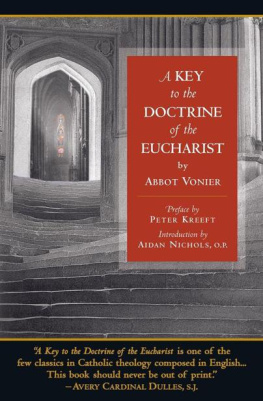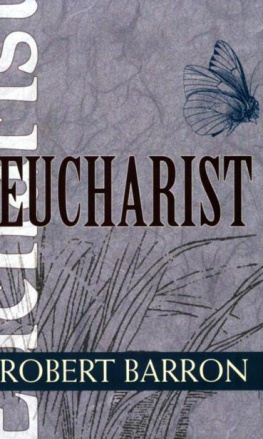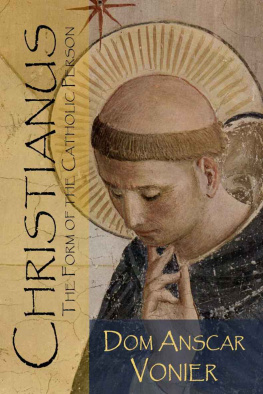Anscar Vonier - A Key to the Doctrine of the Eucharist
Here you can read online Anscar Vonier - A Key to the Doctrine of the Eucharist full text of the book (entire story) in english for free. Download pdf and epub, get meaning, cover and reviews about this ebook. year: 2002, publisher: Wipf & Stock Publishers, genre: Religion. Description of the work, (preface) as well as reviews are available. Best literature library LitArk.com created for fans of good reading and offers a wide selection of genres:
Romance novel
Science fiction
Adventure
Detective
Science
History
Home and family
Prose
Art
Politics
Computer
Non-fiction
Religion
Business
Children
Humor
Choose a favorite category and find really read worthwhile books. Enjoy immersion in the world of imagination, feel the emotions of the characters or learn something new for yourself, make an fascinating discovery.
- Book:A Key to the Doctrine of the Eucharist
- Author:
- Publisher:Wipf & Stock Publishers
- Genre:
- Year:2002
- Rating:5 / 5
- Favourites:Add to favourites
- Your mark:
- 100
- 1
- 2
- 3
- 4
- 5
A Key to the Doctrine of the Eucharist: summary, description and annotation
We offer to read an annotation, description, summary or preface (depends on what the author of the book "A Key to the Doctrine of the Eucharist" wrote himself). If you haven't found the necessary information about the book — write in the comments, we will try to find it.
A Key to the Doctrine of the Eucharist — read online for free the complete book (whole text) full work
Below is the text of the book, divided by pages. System saving the place of the last page read, allows you to conveniently read the book "A Key to the Doctrine of the Eucharist" online for free, without having to search again every time where you left off. Put a bookmark, and you can go to the page where you finished reading at any time.
Font size:
Interval:
Bookmark:

A Key to the Doctrine of the Eucharist
Abbot Vonier
Zaccheus Press
Bethesda
Nihil Obstat:
Thomas McLaughlin, S.T.D.
Deputy Censor
Imprimatur:
Edm. Can. Surmont
Vicar General, Westminster
February 5, 1925
A Key to the Doctrine of the Eucharist. Copyright 1925 by the Trustees of Buckfast Abbey. The text of this edition is from The Collected Works of Abbot Vonier , with minor stylistic revisions. Preface, introduction, cover art and text, and all endorsements copyright 2003-2004 by Zaccheus Press. Zaccheus Press and the colophon are trademarks of Zaccheus Press. For information address: comments@zaccheuspress.com.
Library of Congress Cataloging-in-Publication Data
for Print Edition
Vonier, Anscar, 1875-1938.
A key to the doctrine of the Eucharist / by Abbot Vonier.
p. cm.
Includes index.
ISBN 0-9725981-0-3 (pbk. : alk. paper)
1. Lords SupperCatholic Church. I. Title.
BX2215.3 .V66 2003
234'.163dc21
2003008678
Pater Misericordiae, emitte Spiritum Tuum ut omnium hunc librum legentium et mentum illuminet et cor tangat. Sit instrumentum ad exaedificandum Regnum Tuum. Per Christum Dominum nostrum. Amen.
Visit our webpage to learn more:
www.zaccheuspress.com
Table of Contents
by Peter Kreeft
by Aidan Nichols, O.P.
Preface
by
Peter Kreeft
I am not a professional theologian, but a philosopher; but I read more theology than philosophy, and I have seldom read such a convincing, clear, and comprehensive study in Eucharistic theology as A Key to the Doctrine of the Eucharist .
Its theological depth comes largely from its fidelity to, and its power to illuminate, the Churchs sacred Tradition concerning the Eucharist, and to show very clearly the profundity and reasonableness of the writings of Saint Thomas Aquinas and of the Council of Trent, and how they are rooted in Scripture and the earliest Fathers of the Church. Abbot Vonier makes them intelligible through a philosophy and a literary style that is utterly lucid, penetrating, and humble rather like that of Saint Thomas himself. Although I had not been familiar with his work, having now read Key a jewel of a book I look forward to discovering more of Abbot Voniers work as Zaccheus Press continues its project of reissuing it.
The most stunning effect this book had on me was the realization of the shallow and ephemeral nature of most current theology, by comparison. We dont seem to produce theological thinkers like this anymore. Perhaps this book will begin to remedy that lack, by instructing apprentices and stimulating us to imitation. We dwarfs had better start standing on the shoulders of giants like this, as Father Vonier himself clearly has done.
Introduction
by
Aidan Nichols, O.P.
Anscar Vonier was the most gifted dogmatic theologian writing and preaching in England during the inter-War years. By an unexpected blessing, the English Catholic Church had in its midst a German monk of outstanding competence and spiritual nobility. Born on November 11, 1875, Vonier had left his native Wuerttemberg (still a kingdom in 1888, though within the German Empire) so as to enter a French abbey: La Pierre-qui-Vire in the plateau du Morvan, a bleak and windswept corner of Burgundy. In fortuitous political circumstances he fetched up instead in the valley of the Dart, where that river sweeps down from Dartmoor to the open sea.
In one of the recurring Church-State crises which punctuated the history of the Third French Republic, the monks of Le Pierre-qui-Vire had abandoned France for (as was thought) a temporary exile in Britain. So it was Dom Vonier found himself a member of a new monastic foundation or, rather, re-foundation, as the history of Buckfast goes back to the Anglo-Saxon period. This was by no means the end of squalls. As a young priest accompanying his abbot on canonical visitation to Argentina, he endured, off the Spanish coast, the shipwreck of the liner Sirio which took his companions life on August 4, 1906. Anscar Vonier was elected abbot in his place at the extraordinarily early age of 31.
As his fame grew, it became impossible not to think of him as Abbot Vonier. He who had been the youngest reigning abbot in the Benedictine federation would remain in office until his death on December 26, 1938. To the ordinary English Catholic, he was best known as the rebuilder of Buckfast, which is still the only pre-Reformation monastic house in England to be reconstructed for its original purpose, with a great church worthy of the medieval abbeys. To cognoscenti of sermons on major Church occasions, Abbot Vonier belonged to a charmed circle of great preachers Martindale, Jarrett, McNabb, Goodier, Knox of the 1920s and 30s. That is eloquent of his mastery of what was in point of fact his third language. Endowed with a powerful charism of preaching, he made the English tongue a vigorous instrument for the exposition of Catholic truth. To Catholic readers, that is not least apparent in the prose works where he gave his theological vision, in equal share biblical and Thomistic, a lasting expression. In the priority he gave, within the round of monastic life, to the production of solid works of doctrinal theology for the use of both clergy and laity, he had dare one say it! a Dominican approach to the Benedictine way. Writing came next to the Opus Dei, the celebration of the liturgy, not least because it drew life from the liturgy, overflowed from it.
First published in 1925, A Key to the Doctrine of the Eucharist was evidently written as a Thomist rejoinder to the much-acclaimed and influential Mysterium Fidei , a study of the Mass by the French Jesuit Maurice de la Taille (Paris, 1921). Under the heading A New Theory of the Eucharistic Sacrifice, the Dominican Vincent McNabb, writing in Blackfriars for September 1924, had already criticized one major feature in de la Tailles work. De la Taille had argued that the Last Supper constituted the priestly oblation by Christ of the flesh that, by bloody slaughter, was sacrificed on the Cross. This implies that, considered as the sacrifice of our redemption, Calvary was incomplete without the foregoing Supper and what took place there. It also implies that the first Mass, which the Lord Himself celebrated in the Upper Room, is more truly the opening phase of the Sacrifice of Christ than it is the sacramental presentation of that Sacrifice.
Discreetly, without ever mentioning de la Taille by name, Abbot Vonier seconds McNabbs criticism (whether by chance or through a conscious process I do not know). But his real target (if the phrase may be used of so thoroughly positive a book as the Key ) is not de la Taille, the individual writer, so much as the entire school of thought which, particularly in France, sought to describe the Eucharistic sacrifice in terms drawn elsewhere than from sacramental theology.
Whether by looking to other portions of Christian dogmatics, especially Christology, or by attempting to find general definitions of sacrifice that would suit the case, such authors, in Voniers view, missed the essential point. The Holy Eucharist is first and foremost the Holy Sacrifice not because it is something different from a mere sacrament but because it is, precisely as taught by Saint Thomas, the sacrament of the Sacrifice of Christ.
Vonier believed Saint Thomass approach to be the right one because it gives the clearest account of all the realities involved in their inter-relation. Indeed, it is their ability to inter-relate the various doctrines of the faith, and the circumambient realities with which they deal, that makes both Aquinas and Vonier theologians worth following. But Vonier does not simply repeat Thomass texts. Like all good disciples he is a thoughtful interpreter and not merely an unreflective codifier. So the eucharistic theologian Thomas Aquinas who emerges from Key is significantly different from any other. Above all, he is from first to last a theologian of the sign: what, in the early twenty-first century would be called a semiotic theologian. The world of natural reality and the sign-world of sacramental reality are two different worlds, and yet, in the case of the Eucharistic sacrifice, they yield up to us the same content. The sacrifice of the Mass is the expression in sign of all that our great high priest in his once-for-all offering on the Cross underwent, did, and was. Calvary and the Mass are the self-same reality, in two utterly different modes.
Next pageFont size:
Interval:
Bookmark:
Similar books «A Key to the Doctrine of the Eucharist»
Look at similar books to A Key to the Doctrine of the Eucharist. We have selected literature similar in name and meaning in the hope of providing readers with more options to find new, interesting, not yet read works.
Discussion, reviews of the book A Key to the Doctrine of the Eucharist and just readers' own opinions. Leave your comments, write what you think about the work, its meaning or the main characters. Specify what exactly you liked and what you didn't like, and why you think so.




